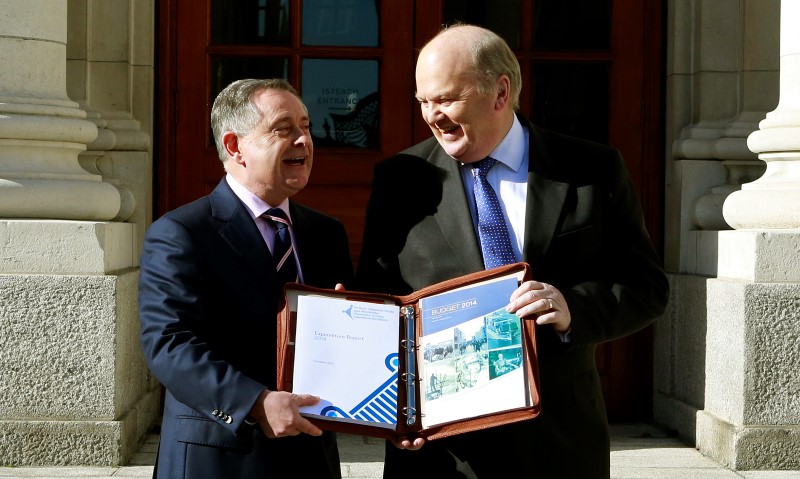By Conor Humphries
DUBLIN (Reuters) - Ireland's economy may post "spectacular" growth of more than 7 percent this year but there is little danger of it overheating or of the government over-spending, a senior minister told Reuters on Wednesday.
Ireland was forced into an international bailout in 2010 by a property crash, a huge bank bailout and chronic government over-spending. But the weak euro and years of pent-up demand helped make it the fastest growing economy in the European Union last year with growth of 5.2 percent.
Now bumper corporate tax returns and a decline in the unemployment rate to below 9 percent have convinced the government the economy may return to 7 percent growth for the first time since the Celtic Tiger era.
"There is every likelihood it ... may well be higher than (the current government forecast of) 6.2 percent at the end of this year," spending minister Brendan Howlin said, adding the final figure could be 7 percent or above.
"It's not unusual for an economy that fell as far as ours did to have an initial bounce-back that is little short of spectacular," he said.
The Irish government was criticised by some economists in October for increasing planned spending this year by 1.5 billion after corporation tax receipts came in far higher than forecast.
But Howlin dismissed as "overly cautious" the critics' warnings that the country should limit spending increases and instead pay back more debt in case the growth rate drops off.
Even after the extra spending, the government is forecasting a budget deficit next year of 1.7 percent, almost half the 2015 target under Ireland's bailout.
"People talk about overheating as if we had an economy working at full capacity. We certainly haven't," Howlin said, citing unemployment at close to 9 percent and little sign of wage inflation.
Ireland's small flexible economy can "shift our footing very quickly" if circumstances change, he said.
INFRASTRUCTURE SPEND
Howlin said Ireland has been one of several European Union countries lobbying the European Commission for some flexibility on limits to infrastructure spending.
While other countries are seeking room to spend on dealing with the refugee crisis, climate change and new security challenges, Ireland is looking for more space to spend money on infrastructure to ensure growth spreads evenly through the country, he said.
He cautioned that the debate in Europe over additional spending "will take a couple of years to work itself out," and would be influenced by the results of a number of upcoming national elections.
Howlin's centre-left Labour Party and its larger centre-right coalition partner Fine Gael are seeking re-election in a vote due by April and the parties have promised fiscal responsibility will be at the centre of the campaign.
"The calling card we will present to the Irish people is a continuation of prudence and there isn't any question of putting anything at risk," Howlin said.

But while Labour has in recent years been more in favour of spending increases than tax cuts, Howlin said there would be no red lines on this issue in negotiating a new programme for government if re-elected.